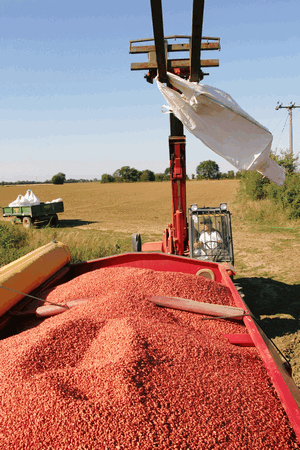Seed prices already tight

Strong cereal prices have had a significant knock-on effect on the cost of seed wheat and barley for this autumn, according to merchants at Cereals 2008 (11-12 June). Many reported typical seed wheat prices of £330-350/t (treated and delivered), almost £100/t more than this time last year, with the newer varieties proving most popular.
Viscount and Oakley had already sold out and Paul Taylor from Grainfarmers said supplies of Cassius were also looking very tight and Cordiale would sell out soon. “New varieties are generally fetching around £100/t more than established 5-6 year-old ones,” he said.

New varieties may be at a premium but many are selling out fast, according to the trade
He hoped there would be no repeat of last season’s extreme movements in price, where C2 wheat seed started the summer at around £230/t, but reached over £400/t later in the season, due to the wet harvest and hike in commodity prices. “Depending on the weather this summer, that could happen again. If the variety is there and it seems to fit your situation, book it, because things could change very quickly.”
Renewed interest in barley meant seed prices and supply were also tight, with seed generally trading at a £5-10/t premium over winter wheat, he added.
A representative from one East Anglian buying group said supplies of Flagon were already starting to get short and other varieties could follow soon. “High input costs mean a lot of people are reviewing everything they’re doing,” she said. “Prices will depend on what the [wheat and barley] markets do, so if you think they’re going to go higher, now’s not a bad time to buy seed.”
Centaur‘s Adrian Fisher said supplies of Flagon, Pearl and Cassata were going to be tight because not as much was grown last year and as a result, seed prices were generally in the upper £300s per tonne. “But, I expect we will see a bigger area go in next season.”
Solstice wheat seed for the Warburtons contract had been capped at £325/t until the end of June, but prices would be reviewed after that, he noted.
Many merchants were a lot more uncertain about the prospects for oilseed rape, although some suggested the area could fall slightly as some growers who struggled to establish crops this year turned to barley instead.
This, combined with stiff competition amongst breeders for market share had helped keep seed prices down, Ian Munnery of Elsoms Seeds said. “Generally oilseed rape prices are only about 5% up. The market seems to be a lot more fragmented and everyone is competing for market share.”
- Higher commodity prices mean seed costs also increased
- Also some quality and quantity problems following wet 2007 harvest
- Wheat seed typically £80-100/t more than 2007
- Future prices depend on weather and market fluctuations
- Some varieties already sold out
- Barley proving more popular
